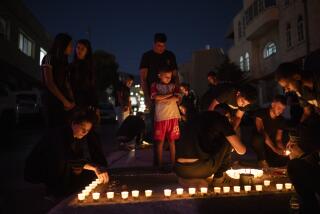Review: Steven Pressfield goes to war’s front lines in ‘Lion’s Gate’
In his deeply reported and compellingly told “hybrid history” of the 1967 Arab-Israeli war, one of the many voices that combat novelist Steven Pressfield presents is that of Boaz Amitai, a reconnaissance platoon commander in the Israelis’ perilous push through the Sinai to the Suez Canal.
Tens of thousands of Egyptian soldiers — backed by hundreds of Russian-made tanks — are waiting in the Sinai, prepared for the war that Arab leaders have promised would destroy Israel.
Amitai tells Pressfield that as he drives “across ten kilometers of hell,” he feels the presence of the Angel of Death speaking to him.
“‘You,’ he says to one man, ‘I shall take you now.’
To another: you wait. I will come for you later.
It is a terrible feeling.”
The feeling comes from the opening night of the Six-Day War, but it is also the ominous feeling of other wars in other places and other times. It is a universal response to combat, a mix of dread and adrenaline, that Pressfield conveys with mastery.
His previous books — among them “The Afghan Campaign” about Alexander the Great, “Killing Rommel” about the World War II battle for North Africa, “The Profession” about a fictional rogue American general in the Middle East, and his classic “Gates of Fire” about the Greeks at Thermopylae — have shown his ability to write about a specific war in terms of all wars.
“The Lion’s Gate: On the Front Lines of the Six Day War” is not a comprehensive look at the 1967 war. Those books have been written, lots of them, as Pressfield notes in his introduction. Instead, “Lion’s Gate” is the war seen by Israeli pilots who destroyed the Egyptian air force in a preemptive strike, soldiers (like Amitai) who fought in the Sinai, and paratroopers (including Ariel Sharon) who reclaimed the old city of Jerusalem from the Jordanians.
“Lion’s Gate” is part reported history, part novel, what a generation ago was called the “new journalism.” Pressfield spent weeks interviewing Israelis about the war, and he presents their recollections in bursts of short chapters, with certain voices reappearing as the tension increases.
Pressfield presents the Israelis’ stories as if each of them were speaking in the first person. Taking the novelist’s privilege, the prose belongs to Pressfield, but the fear and exhilaration of the known and the unknown belongs to the individual warrior. Each short chapter presents the view of a specific soldier or aviator, from a general to a foot soldier.
To be sure, “Lion’s Gate,” is not, in conventional journalistic terms, a balanced account. The voices are Israeli. There are no Arabs.
Pressfield notes that as a secular American Jew, he felt the 1967 war was “his” war even though he had never visited Israel. For “Lion’s Gate” he spent nine weeks in Israel, interviewing 70-plus Israeli military personnel.
“We attack like wolves, meaning we know the pattern, we know the sequence,” says pilot Menahem Shmul. “…every beast in the pack knows what to do. The basic pattern is bomb, strafe, strafe, strafe.”
In the Sinai, the Egyptian forces have buried land mines. Through the account of recon platoon commander Lt. Eli Rikovitz, Pressfield describes a half-track hitting a mine: “The world becomes bright yellow: I go deaf. The floorboard kicks me upward like a diving board. The half-track rises straight up, hangs for a moment, then crashes straight down on its front wells. All seven of us are flung out onto the sand.”
The result of Pressfield’s unique approach is an account that builds in intensity from the anxious days before the airstrikes to the triumphant entry into the older part of the sacred city through the Lion’s Gate that leads to the Western Wall.
To re-create the voice of Moshe Dayan, who died in 1991, Pressfield consulted Dayan’s writings and conducted interviews with his relatives and soldiers who served with him.
The Dayan of “Lion’s Gate” is confident, brash and skilled in the complexities of Israeli politics. Speaking of his Arab enemies, he summons not hatred but memories of his youth in a kibbutz: “I grew up with Bedouin herders and farmers. We have plowed together, and planted, and sat side by side in the furrows to take our noon meal. Who is the Arab? No man makes a better friend than he. None will stand his ground with greater courage.”
In the Sinai, Egyptian soldiers drop their weapons and flee.
“I feel sorry for the Egyptians,” says Cheetah Cohen, a helicopter commander. “The poor foot soldiers, most of whom are simple fellahin — peasants from the delta — have been abandoned by their officers… God knows what they are suffering from thirst and heat, grief and shattered pride.”
Belief in their mission never wavers among the Israelis. “If we lose, what our enemies will do to us will make Auschwitz look like summer camp,” says Danny Matt, a paratroop commander under Sharon.
A former U.S. Marine, Pressfield knows war and he knows the men who fight wars. He admires the Israelis for their victory, but he does not discount the grim losses on both sides.
Rikovitz, as related by Pressfield, has a conclusion that was true in the Sinai as it would be true later in Sangin (Afghanistan) and Ramadi (Iraq) and dozens of other places where men are ordered to kill other men.
“We looked death in the eye, but death did not look away,” he says. “He took as many of us as he wanted.”
The Lion’s Gate
On the Front Lines of the Six Day War
Steven Pressfield
Sentinel: 430 pp., $29.95
More to Read
Sign up for our Book Club newsletter
Get the latest news, events and more from the Los Angeles Times Book Club, and help us get L.A. reading and talking.
You may occasionally receive promotional content from the Los Angeles Times.








